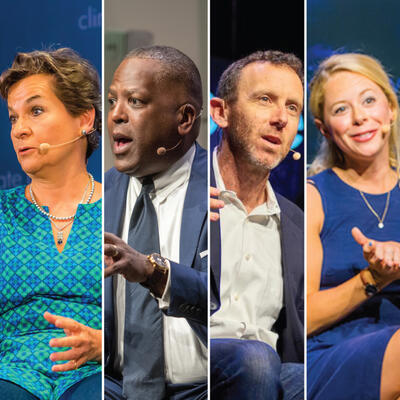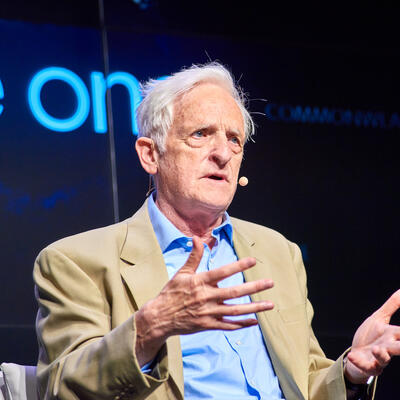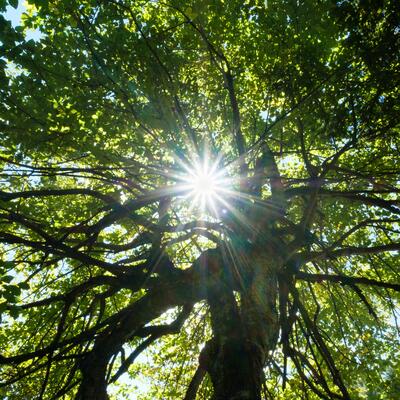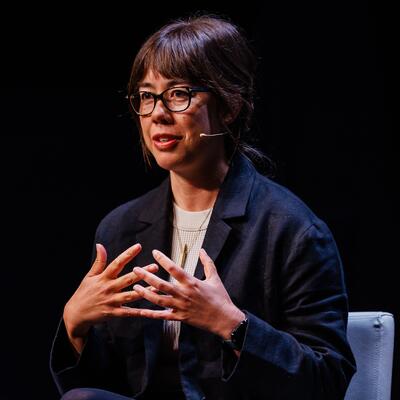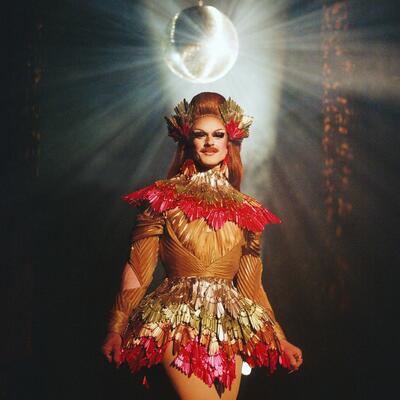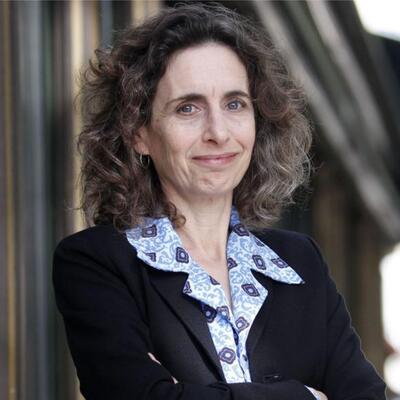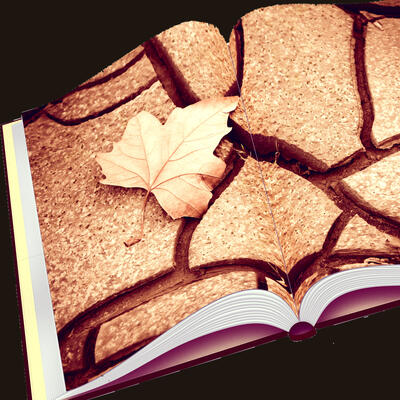
Storytelling Through the Climate Crisis
Guests
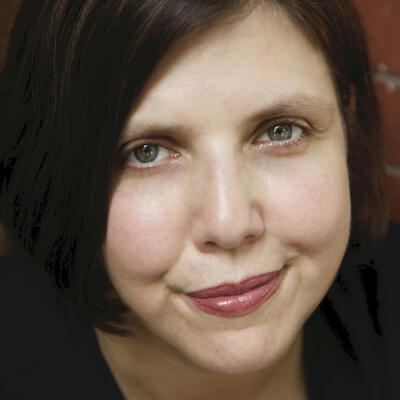
Jenny Offill
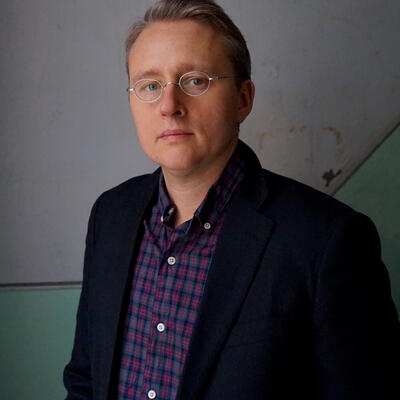
Roy Scranton
Summary
How are writers using stories to help readers – and themselves – process the experience of climate change? Author Jenny Offill felt a “creeping sense of dread” when she delved into climate science while writing her her new novel, Weather, which features a woman who produces a climate change podcast. As the gravity of the facts sank in, one day Offiil asked herself, “Why do I know this and believe this intellectually but I don't feel anything?”
As the book developed, she vowed not to load it with facts, which often cause readers to give up because they are more than they can bear. Weather artfully follows the podcast host Lizzie as she weaves between daily tasks of parenting a young child and a growing realization that tomorrow will be hauntingly different from today.
Roy Scranton, author of We’re Doomed. Now What? says Offill’s book and other novels can help us confront and process the stark realities of a climate that is increasingly destabilized. “Fiction allows us to participate sympathetically in scenarios that would destroy us if we actually lived through them,” he says.
Reading a dystopian book or watching a film such as Mad Max allows us to identify with characters while also remaining distant. “They can give us access to things that we can’t handle in our day-to-day lives.”
What’s the bottom line that both authors are asking us to confront? “The human world that we live in is impossible,” says Scranton. “We can’t go on living the way that we live this dependence on fossil fuel capitalism.” The transformation necessary to avoid climate catastrophe would make the Cultural Revolution “look like a momentary burp” and the Industrial Revolution like a “minor event.”
Jenny Offill doesn’t buy the notion that scale of change is even remotely underway. “All of the talk about hope always sounds kind of thin,” she says. “I don't think I ever really believed we were as secure as we seemed.”
Related Links:
Weather by Jenny Offill
Department of Speculation by Jenny Offill
We’re Doomed. Now What? by Roy Scranton
Learning to Die in the Anthropocene by Roy Scranton
This program was recorded via live stream on April 10, 2020.
Full Transcript
Greg Dalton: This is Climate One. I’m Greg Dalton.
Jenny Offill: A lot of the climate change literature that was out there was existing often in a dystopian sphere. And I wanted to kind of write a pre-apocalyptic novel, like what’s it like to have that be your companion right now.
Greg Dalton: Author Jenny Offill felt a “creeping sense of dread” when she delved into climate science while writing her new novel, Weather.
Jenny Offill: Why do I know this and believe this intellectually but I don't feel anything.
Greg Dalton: Author Roy Scranton says novels can help us confront and process the stark realities of a destabilized climate.
Roy Scranton: Fiction can give us access to things that we can’t handle in our day-to-day lives. We’re talking about the end of the world as we know it and the emergence of something entirely new.
Greg Dalton: Storytelling Through the Climate Crisis. Up next on Climate One.
---
Greg Dalton: How are writers using stories to let readers experience climate change, without being overwhelmed by it? Climate One conversations feature oil companies and environmentalists, Republicans and Democrats, the exciting and the scary aspects of the climate challenge. I’m Greg Dalton.
Jenny Offill: I don't think I ever really believed we were as secure as we seemed. [I always felt like things could unravel very quickly.] So in a way learning about climate was sort of having my worst fears proven by science that it could all come apart.
Greg Dalton: Jenny Offill is a writer and novelist whose most recent book (of fiction) is called Weather. The story follows Lizzie, who works on a podcast about climate change, as she weaves between the daily tasks of parenting a young child, and a growing realization that tomorrow will be hauntingly different from today. Offill says writing the book helped her learn to navigate the uncertainties of the climate crisis.
Jenny Offill: If I'm feeling dread, if I'm feeling fear, if I'm feeling anger, that's good to look directly at and not think that it should be shoved away.
Roy Scranton: Fiction allows us to participate sympathetically in scenarios that would destroy us if we actually lived through them.
Greg Dalton: Roy Scranton is Professor of English at the University of Notre Dame and a prolific writer whose books include Learning to Die in the Anthropocene and We’re Doomed – Now What? Scranton admires Offill for creating fiction that allows readers to confront climate uncertainty, while creating enough distance so it doesn’t overwhelm.
Roy Scranton: She’s able to put it in this amazing aesthetic shape is what lets us go in and feel those feelings. They’re our feelings and we can’t feel them in our own lives, but by giving them to Lizzie, we can feel them. And that's worth a great deal.
Greg Dalton: I began my conversation with Jenny Offill and Roy Scranton by asking Jenny how the nonlinear and fragmentary structure of her book, which doesn’t read like a regular novel, reflected her own way of thinking.
Jenny Offill: I was interested in writing a book about someone who was grappling with both seemingly every day mundane things, she works as librarian, and she's a mother and a wife. But also was starting to have more of an expansive sense of what was going on with the climate, and a sense of kind of growing emergency. And I decided to write it in this fragmentary form, because I wanted to show how these flickers of understanding would come in and then go away again. And I also created a lot of different formats for it. So sometimes there's questions and answers in it. Sometimes there's the regular narrative, but there's always white space in between things or I think of a way for the reader to kind of bring their own train of association into the story.
Greg Dalton: Yeah, it took me a while to kind of get that format that fragmented format when I first started reading on it and I was like oh now I get it. And there’s some really interesting concise references to hockey-stick graphs and the Holocene and other climate terms in there that’s really interesting. And how did you come to write a book about two women working on a climate change podcast?
Jenny Offill: Well, one of my best friends, Lydia Millet is a novelist, and she also works for the Center for Bio-Diversity in Tucson which as you know, does all sorts of work with endangered species. And for years, she's been talking to me about all of this. We also talk about novels and people we know and everything. But a sort of creeping sense of dread was coming into these conversations. And at a certain point, I realized that it was switching away from biodiversity to being under the bigger umbrella of climate. And one day I just thought to myself, why do I know this and believe this intellectually but I don't feel anything. And that began kind of a process of trying to figure out, we all hear about climate denial in the sort of classic sense of someone saying oh, it's not happening. But to me there was a much softer form of it, which was it took sort of two forms it either took, well, I haven't really paid that much attention to it it’s something that’s gonna happen way down the road. Or, once you look into it and see how dire it is, I think there's another version, which is just very fatalistic. Like it's already gone too far, what is there to do. So I wanted to write about someone navigating that and I myself had to navigate that when I was writing it.
Greg Dalton: Roy Scranton, congratulations on getting tenure at Notre Dame.
Roy Scranton: Thank you.
Greg Dalton: You've written that, in one of your books, you wrote, “I joined the Army so I could write with the authority not just about war, but about history, love, life, meaning and truth.” Noting that George Orwell, Norman Mailer also went into battle with some sense already wanting to be writers. So how did being a soldier in Iraq to prepare you to be a writer exploring the existential threat of climate change?
Roy Scranton: Well, it was something of a romantic delusion. It was like it was I had drunk the Hemingway Kool-Aid in a sense and bought into this idea that the intensity of existence in war gives special access to human truths. And one of the really important things that I learned in Iraq was that that's an ideology, right, that that's it's a romantic ideology. And this was one of the things that I really that was really important to me to write about after I came back from Iraq was that over and over again I saw the narratives in the culture in American culture focusing on the trauma of individual American soldiers. Because that was the story that we knew and that we sort of that people fixated on was, you know, how individual American soldiers were sort of torn apart and damaged by the violence that they were a part of. Which, you know, seemed completely a misapprehension of what was actually happening in Iraq, which is that thousands and thousands of Iraqis were being killed, were dying and their country had been just disassembled. And that disparity right as, you know, was a powerful inspiration to me like trying to understand like why is there this disparity. How are the narratives that we come into it different from the reality that’s actually happening? And I think that, you know, that difference between narratives and reality has been key to my thinking about how we understand climate change, right. Trying to make sense of the disparities between the ways that we think about climate change and what's actually happening. The other thing I would just say briefly, the more I guess quotidian way that my time in the military and in Iraq has informed my thinking in approach about climate change is that I saw a city and a country fall apart under the pressures. I mean this was a military invasion, shock and awe. But, you know, the sort of cascading failure of what happens socially, politically, when the infrastructure that you depend on the social infrastructure and the actual physical infrastructure you depend on for day-to-day life is disassembled is blown apart. And it was an alarming thing to see, you know, the invasion was incredibly violent but then the greatest violence during the American occupation during that ten-year period in Iraq was actually the Civil War. The most destructive violence was the fight between the Sunni and Shia in Baghdad and in the rest of the country that American governance sort of allowed and fostered through in large part the way that we let the infrastructure collapse and the way that we managed that collapse. And so what that has given me is a deep pessimism and skepticism about the capacities of the systems that we live within to be able to manage successive catastrophic shocks and then also deep concern about the political consequences of that, right. So when things start to fall apart and people feel increasingly threatened and don't feel like they can depend on the structures of life that had held us. Like what do people do where do they turn to for security and a sense of stability and who steps in right to take on that role.
Greg Dalton: Cascading systems collapses. Jenny Offill, you wrote your book over a period of six years and climate change the law, the knowledge of climate the understanding of climate. How did your thinking and relationship with climate change over the six-year period that you wrote Weather?
Jenny Offill: Well, in the first year or two of writing it I think that, you know, I became the person that would ruin your dinner party. Because I basically, I have that feeling that I've actually heard other people talk about when they’ve been sick or have some kind of chronic illness where you kind of can't believe that the world is going along in its usual way because there's an emergency. I think there's sort of on fire that you know about. But I also have a built-in sort of my personality is not very much like as cold. So I wasn't necessarily talking to people about their individual responsibility because I felt like there was a way in which that had been pushed by the more powerful interest that this idea of are you green enough, do you change your lightbulb to the right kind. And there's a way in which that had made me personally feel completely like I couldn't be any kind of activist because I was too much of a hypocrite. So as I got deeper into it, in the beginning I felt like it was very hard when anyone would talk about the future and they would think of it especially if they were talking about things that had to do with their children or with their own aspirations. I kept thinking the world is gonna be so different there’s gonna be so many different rolling disasters that you can't count on these things. As I got further into the book I think I began to feel more hope about collective action. I spent more time studying movements whether it was like the Anti-Apartheid Movement or what felt to me like somewhat analogous on a smaller scale movement the ACT UP Movement, which helped get people to pay attention to the emergency of the AIDS crisis. But in a funny way being a writer and being a teaching of writing I already always felt like the main job requirement was to be able to tolerate uncertainty because it's a very uncertain profession but it's also each time you write something you don't know how it will turn out or what it will be. So one of the things I think and I think Roy was talking about this is that both with climate and with the crisis we’re going through now with the pandemic. I don't think I ever really believed we were as secure as we seemed. I always felt like things could unravel very quickly. So in a way learning about climate was sort of having my worst fears proven by science that it could all come apart. And just like with the Trump administration we saw to a large degree that things that we think of as part of the government like press conferences are basically based on a gentleman’s handshake and can be dissolved. That’s the way I feel about a lot of the way we've constructed being so far away from our everyday needs and the idea that we can at any moment just get that out of season tomato or get to where we want to go or all that sort of instantaneous gratification that we have in parts of the West it fell apart very quickly with this. And it will fall apart very quickly as climate things continue to come down the pike.
Greg Dalton: So how do you cope with that sense of uncertainty and vulnerability that you said we’re not as secured as we thought we were. Where does that go how do you sit with that?
Jenny Offill: Well, I think the word sit is an important one here. I'm not a Buddhist but I'm drawn to that philosophy in many ways. And I guess as a writer I feel like Americans, especially we have an idea that there's good emotions and bad emotions to have. And I think I believe that like if I'm feeling dread if I'm feeling fear if I'm feeling anger that's good to look directly at and not think that it should be shoved away. So I feel like fear was something that had to be gone through to think more clearly about what I could do. And of course it was a very silly thing ultimately, I mean I would come out of my study and say to my husband, well, I’m so glad I solved climate change by writing this novel. It just seems like such a totally idiotic thing to do. But I kept thinking about how well that's the thing that I know how to do best. And a lot of the climate change literature that was out there was it’s not that works very well but it's existing often in dystopian sphere. And I wanted to kind of write a pre-apocalyptic novel like what’s it like to have that be your companion right now. People all over the world who live in less secure circumstances than us live with that kind of dread and insecurity in their daily lives and I was like its coming here now. So I started reading what people did in other times of great trouble. Whether it was during sieges, whether it was, I read a lot about Sarajevo read a lot about Leningrad. And I was sort of heartened to see that music and reading and continuing to practice sort of decent values. Whether it's giving a little last bit of something to your neighbor or not that’s how people have always made it through. Not through these silos of dread or individual bunkers.
---
Greg Dalton: You’re listening to a Climate One conversation about storytelling through the climate crisis. Coming up, living with – and writing about – an uncertain future.
Roy Scranton: We’re talking about something that at this point is completely unknowable, right. We can't know what that will look like, and who we will be, and what will be important to us when we get there.
Greg Dalton: That’s up next, when Climate One continues.
---
Greg Dalton: This is Climate One. I’m Greg Dalton, and we’re talking about how writers and novelists can help us make sense of climate change, with Roy Scranton, author of We’re Doomed – Now What? and Jenny Offill, author of the new novel Weather. Jenny’s protagonist, Lizzie, is a PhD dropout librarian who’s helping her former mentor Sylvia on a climate change podcast. In one especially poignant scene, with Lizzie sitting at the table as her young son tries all his colored markers to see which ones work, Jenny writes that according to the current trajectory New York City will begin to experience dramatic life altering temperatures by 2047. I asked her about juxtaposing this beautiful moment, sitting with a child who is coloring – something every parent can identify with – with a jaw-dropping statistic about what's coming.
Jenny Offill: About halfway through the book I decided okay I was reading so much nonfiction and as you know, reading climate sometimes there can be almost ticket of statistics and that you have to get through to get to anything else. Of course it's all important, but I have noticed that when I give these books to people they often don't make it past the first chapter because of that. So I made a rule for myself as a novelist. I said no numbers I’m not gonna put numbers in. And then I decided I was gonna put that number in because it was the number that happened to cause my “oh my God moment” when I put my daughter's birth date into one of those climate things and saw how much it was going to go up and when we’re gonna lead the historical record supposedly it’s probably faster than that now. But one of the things that I think about when we talk about sort of hope and despair with climate is that I think that the reason all of the talk about hope always sounds kind of thin. It’s not because it doesn't exist but because it's very particular to each person. For one person, it may be that they are gonna garden. For another person, it may be that they are going to be doing many more things in their community to help others. For another person it may be that they sing and acquire or study mystic thought. This doesn't mean that we're supposed to not think collectively, but I think in the same way when someone is telling you about someone they’ve fallen in love with. And there could be this sort of moment where you're thinking, okay I guess that is really amazing that they have a blue sweater or I don't know why it's so particular that the fact that this person bird watches makes you love them. But I feel like when we're looking for things against this backdrop of kind of ambient doom, what brings joy what brings solace it's not transferable necessarily on a wide scale. But it is about this sitting and pause and recognizing what we need and what we don't. I feel like it's very awkward in the beginning stages of learning a new way to live. Right now everyone's awkwardly trying to learn to Zoom. Everyone's awkwardly trying to visit at 6 feet apart but humans adapt that's what we do. And I do think that some of these trial runs we’re having during this terrible time may be of use later when we also don't have what we think is enough or a bounty.
Greg Dalton: Right. This could be practice for the like adaptation to come regarding climate change. Roy Scranton, you say how literature can take people into a place that Jenny mentioned the fact dense, well-intentioned nonfiction books. And I've interviewed many authors a lot of them on this radio show and podcast but I think they have limits on how they reach people. And literature can take people to a place that nonfiction can’t. So tell us about how literature can help us ease us in to climate reality.
Roy Scranton: I think fiction has a special dispensation as it were, when it comes to human thought and interaction. Which is that it allows us to engage it allows us to participate sympathetically in scenarios that would destroy us if we actually lived through them. We can watch King Lear or we can read a dystopian novel or we can read whatever. And part of what’s happening there is we're imagining ourselves we’re identifying with the protagonist but we’re also distant. There’s some estrangement there we’re also thinking about the protagonist this sort of as someone else, right. And so there's this duality going on that allows us to feel the emotions opened up by this narrative form and this story while also not feeling entirely overwhelmed by them. And I think that's an incredible thing that fiction can do and particularly with narrative. I think both fiction and literary nonfiction more broadly are able to take the facts and data and analyses and reportage of journalism and science and what have you. And they’re able to articulate those in ways that we can relate to not only in terms of strictly narrative in terms of identification with the protagonists but also through form, through aesthetic form to shape an emotional experience. They can give us access to things that, you know, that we can’t handle in our day-to-day lives. And I think that's one of the incredible things about Weather, about Jenny's book is that it does that for the life we’re living now, right. Part of the reason I think it's such a remarkable achievement is because it allows us to feel the things going on in our lives that we can't feel right now because it's too much. If you live with constant consciousness of a trajectory that the world is on and our individual powerlessness in the face of these massive geological and climatological forces and the immense obstacles faced by any kind of collective organization against, you know, to try to change things. Just like if you’re really there all the time and you think about how massive climate change and ecological catastrophe are, you would weep, you would shut down, it’s too much to live with all the time. But we’re nevertheless aware of it, right? And that dichotomy that estrangement is sort of is what gives Jenny's book its it seems like its form. And that, you know, she’s able to put it in this amazing aesthetic shape is what lets us go in and feel those feelings. They’re our feelings and we can’t feel them in our own lives, but by giving them to Lizzie, right, then we can we can feel them. And that's worth a great deal.
Greg Dalton: If you’re just joining us we’re talking about storytelling through the climate crisis with two writers, Jenny Offill and Roy Scranton, I’m Greg Dalton. [pause] Jenny Offill, I’m curious how becoming climate-conscious has changed who you talk, and you said you’re kind of the you play the doom role in your friend group. Who can you really talk to --
Jenny Offill: Well, the reason I met Roy originally is that I read some tiny little thing about basically a group of people gathering to have climate discussions. And this was five or six years ago. And it was very unlike me because I can be kind of introverted but I figured out because I’m a good researcher who was running this thing. And I wrote a note and asked if I could come and I met a lot of people there that I didn't keep going to this thing. But I met some science writers I met Roy and other people. And it was such a relief to be around other people that were not spinning it as better than it was, were not tacking on that obligatory note of hope. But we’re talking about what can we do with what is the actual reality. But I will say this particular pandemic has really shown me that I didn't know, no matter how many rehearsals for disaster I did in my head no matter how many versions I had of what might go wrong. This was not the one that I was thinking about. And so I think it's a really kind of a welcome humility in that in not understanding that all of these preparations all of these wishes we’re still just best at doing the things that humans have always done to get through trouble. Which is to huddle together with other people to try to help people that need it, but also to try to prepare yourself in terms of your inner strength. I think that I started the book reading a lot about preppers, material prepping and I came to find that very sort of immoral by the end of it. The idea that you would somehow cut yourself off from others. But I did become very interested in the idea of emotional and spiritual prepping. And there's a line towards the end of the book which comes from these monks, Greek Orthodox monks and it says they’re asked what they do all the day and they say we have died and we are in love with everything. And I feel like I want to keep both those things in my head at the same time and I want to talk to more people about it. Because oddly about a year ago I read The Plague and I was just reading it in terms of climate stuff because there's a really interesting idea in there that he attributes to the doctor, it’s active fatalism. And Camus talks about active fatalism as fumbling forward in the dark trying to do good and not knowing if it will work. And that's where I am, I feel like I don't know that it will work. It's actually hubris to know what will work but I also want to do that fumbling forward. And I found more ways to do that since I wrote this novel and more just so many interesting people working on different parts of this question and problem. And the truth is I think we all know who’ve been studying it for a while there is more consciousness about it now. There is more of a sense of people that never were interested in it looking at it a little bit.
Greg Dalton: If you’re just joining us we’re talking about storytelling through the climate crisis with two writers, Jenny Offill and Roy Scranton, I’m Greg Dalton. [pause] Roy, you wrote a book, We’re Doomed. Now What? And talk about kind of going into the grief and into the darkness. I’d like to hear your response to what Jenny just said.
Roy Scranton: One thing that definitely seems worth thinking more about is the unknowingness that we find ourselves in and how fundamental that is to our condition.
Greg Dalton: Another Buddhist idea.
Roy Scranton: Yeah, yeah, another Buddhist idea. And that idea of, you know, that Jenny was talking about of trying to do, I forget active fatalism, of trying to do good in this kind of stumbling way in the darkness. That seems in some ways the best that we can do right now is to emphasize the unknowability of the future and commit nevertheless to some kind of ethical action in that unknowingness.
Greg Dalton: Many climate advocates will say, no, we got to bend the curve. They wanna construct the future and the scientists can tell us something about the future. But if you wanna solve climate change you don't say, I don't know, you got to create a plan and sell it and build action around it.
Roy Scranton: This is the question of the old world and the new world as it were, right. Scientific reports are increasingly warning, especially over the past year that we're in a period of real uncertainty as to the inevitability of massive abrupt catastrophic tipping points. We don't know whether or not there is enough time to keep the entire global climate and ecosystem from tipping into rapidly accelerating transformations and regime shifts. We simply don't know, it might already be too late. But even if it's not too late, right, even if there is still a chance. Nevertheless, right, the world that we live in, the human world that we live in is impossible. We can’t go on living the way that we live this dependence on fossil fuel capitalism. Even in the most utopian possibility, what we’re talking about is a global revolution in human civilization, right. What we’re talking about is a complete transformation on the other side of which we can actually know what that will look like. We’ve been talking about something that would make you know, the Cultural Revolution in China look like a momentary burp, right. We’re talking about something that would make the Industrial Revolution look like more minor event, right. We we’re talking about rapid global transformation in human values, and energy infrastructure and political systems. I mean this is what scientists for the IPCC or the IPBES, or these other organizations are telling us is necessary in order to, right, be able to get off the trajectory we’re on. So that's the best case scenario. So even in that scenario we’re talking about the end of the world as we know it and the emergence of something entirely new. So even in that case we don't know like even if one is entirely committed to renewable post-carbon future, sustainable in some way, still dealing with significant global warming and its effects which is already baked into the system, right. But potentially, you know, flattening the curve as it were of warming and giving us more time to adopt, even that scenario, we’re talking about something that at this point completely unknowable, right. We can't know what that will look like, and who we will be, and what will be important to us when we get there.
---
Greg Dalton: You're listening to a conversation about storytelling our way through the climate crisis. This is Climate One. Coming up, what kinds of fiction do writers read?
Jenny Offill: The main writer that I like to read who’s a fiction writer about climate is Joy Williams.
Roy Scranton: Knud Rasmussen’s transcriptions of Inuit folktales.
Jenny Offill: I read my friend Lydia Millet.
Roy Scranton: There was a book Vanessa Veselka published a few years ago
Jenny Offill: You could just re-read Rilke.
Greg Dalton: That’s up next, when Climate One continues.
---
Greg Dalton: This is Climate One. I’m Greg Dalton. We’re talking about how writing and fiction can help us cope with climate anxiety with Roy Scranton, Professor of English at the University of Notre Dame, and Jenny Offill, author most recently of Weather. I asked Jenny what other works of art or literature on climate have inspired her.
Jenny Offill: For me there’s I would say the main writer that I like to read who’s a fiction writer about climate is Joy Williams. I think she's been writing on environmental things for 30 years but her fiction is incredibly intricate. She wrote a tiny series of books called 99 Stories about God and each of them kind of is like a little environmental table. Can I read it, it’s like one paragraph.
Greg Dalton: Sure.
Jenny Offill: “The Lord was in a den with a pack of wolves. You really are so intelligent, the Lord said, and have such glorious eyes. Why do you think you’re hounded so? It’s like they want to exterminate you, it’s awful. Well, sometimes it’s the calves and the cows, the wolves said. Oh those maddening cows, the Lord said. I have a suggestion. What if I caused you not to have a taste for them anymore? It wouldn’t matter. Then it would be the deer or the elk. Have you seen those bumper stickers on the hunters’ trucks—DID A WOLF GET YOUR ELK? I guess I missed that, the Lord said. Sentiment is very much against us down here, the wolves said. I’m so awfully sorry, the Lord said. Thank you for inviting us to participate in your plan anyway, the wolves said politely. The Lord did not want to appear addled, but what was the plan His sons were referring to exactly?” I like that because she often talks about the human impact on animals and on lands that were taken over for human purpose. But in her novels and in her short stories she ranges across like this whole world of theology and ideas of existentialism and whatever to bring it back in to a story. So I read her, I read my friend Lydia Millet wrote a trilogy called like Magnificence, Ghost Lights, How the Dead Dream. And all of these are about what it's like to truly engage with the nonhuman beings among us. And I think to me that's a pretty underexplored thing in fiction. Not so much in nonfiction there's lots of interesting writing about it. But that’s something that I feel like I'm going into kind of a new territory when I read.
Greg Dalton: There was an author who tweeted recently that she has read your book Weather and said you had her what heart palpitations.
Jenny Offill: Oh well, I hope that’s good. Yeah, I’m trying to knock them dead. That's my theory. Yeah, so that’s what I read but I mostly read I gotta say I mostly read poetry and philosophy and psychology and sociology to get a bigger -- I put together like a list of the sort of things I’d found called tips for trying times that I put on my website. So that's mostly what I'm reading now. What about you, Roy?
Roy Scranton: Well on the question of the sort of human, nonhuman interaction. Something I like to teach and has been in my thoughts about climate change since I read it is Knud Rasmussen’s transcriptions I guess of Inuit folktales. It's a tiny little book and it’s got just like 150 or something. Mostly relatively short Inuit folktales that were transcribed to as sort of you know the people in Greenland and Canada were being forced into literacy and education. And there's an amazing, so they were coming they came down from the oral tradition. And there’s an amazing quality of the language and of metamorphosis at work in these stories that has something both profoundly strange and intimately familiar to it. So I really like that.
Jenny Offill: I have one of those in Weather. Did you notice it?
Roy Scranton: I did, in fact. Yeah, I did.
Jenny Offill: It’s called When Houses Were Alive.
Roy Scranton: Yeah, yeah, that’s exactly. That’s right. There’s one of those in Weather. That's exactly what I’m talking about. That story too has that quality.
Jenny Offill: It’s like the flickering between the human and the nonhuman and the sense that in this world it’s not seen as so separated.
Roy Scranton: Right. Right, right. That there isn’t a real division. There are still sorts of ontological divisions wherever but it’s not in that way, right. The human and the nonhuman like are all human in a way or whatever they’re all spirit in a similar way. Yeah, which is I find really provocative and persistently profound and inspirational. There was a book Vanessa Veselka published a few years ago called Zazen, which is, I only read it about a year ago I think. But I thought it was one of the most interesting and sort of, you know, deeply like immersive explorations of some of these political questions about like how far does your commitment go in terms of environmental politics. And like how does that relate to your own individual relationship to the world and to the natural world. And how do all these things mesh together. Yeah, that's another one. I mean I could come up with --
Jenny Offill: And we can all just reread Rilke.
Roy Scranton: Yeah, right.
Jenny Offill: And I just read, I just taught to my class this book by it's called Crow with No Mouth by Ikkyu. Like he was this sort of very Zen monk but also lived quite the high life going to whorehouses and drinking a lot. So it has a very interesting kind of merging of the so-called sacred and profane. But it's great and it's so funny and sort of, it’s a really good book.
Greg Dalton: We’re talking on Climate One with Jenny Offill and Roy Scranton, two writers, about how storytelling can help us through the climate crisis. [pause] As we get to the end, I wanna -- you both have daughters. I wanna ask you how you talk to children about climate and Jenny I saw you on the Seth Meyers Show recently with some very clever references to how people think about preparing their children. And you talked earlier about kind the emotional, spiritual preparedness versus the physical preparedness. But how do you talk to children think about preparing them for the future we've been discussing?
Jenny Offill: Well, I think there's a line that I put it in Weather which actually was something that this guy I know who’s been an environmentalist for many years told me. I asked him the same question about his six-year-old at the time and he said, well, it’d be good if he had some skills. And I said what do you mean? And he said, oh, you know, things are gonna fall apart he’s gonna need more skills. So I thought a lot about that afterwards. And for a while I was kind of thinking like I made a joke about it on TV but I was thinking like is it about physical prowess is it about like knowing how to build things all this kind of bush craft stuff. But ultimately I felt like what I wanted to do was give as much as possible an example in my own life of how you can furnish your mind for hardship by reading widely and trying to build emotional intelligence. Because I mean if there were a real doomsday nobody would let me in skill wise. I don't have any skills I've zero skills. The only way I could come in is if I was practicing my disaster psychology or fixed trickery or just noticing who's eyes looked like they had gotten really weird over the last few days of living together. So I feel like that kind of sensitivity to a range of feeling is I think a form of adaptability that we don't talk about. Because however we’re going to live through this next unforeseen time most of us are not gonna live completely alone. And being able to understand I keep saying to people that are writing me about the fights they're having at home. I'm like everybody's just cracking up in a different way. Like one person is like, we can only eat the freeze-dried food. One person is like, you know, eating all of what they have the first day. Another person is like exercising maniacally. It's like I think of feeling of kind of tenderheartedness towards the humans that are struggling each in their own way to survive these very difficult times is maybe what I would try to give her.
[01:12:59] Greg Dalton: And on the Seth Meyers Show you made a reference to archery which evoked of course the image of the Hunger Games.
[01:13:05] Jenny Offill: Right. My joke which I never saw but my joke was that all these rich women would talk about teaching their kids should learn Mandarin. And I’d be like, oh no archery. But also, yeah, I told her also my one tip was that you should keep chewing gum because supposedly that makes your brain think that things are normal. Because that you could be chewing gum, then you're not like running away from some predator.
Greg Dalton: Roy, how do you talk about climate with vulnerable children?
Roy Scranton: I mean my daughter is only she turns three in June. Some ways in which these conversations like they're not fully emergent yet. I do think about some of the things Jenny was talking about, particularly this kind of spiritual and psychological resilience and adaptability given the unknowingness that we’re in. The radical one unknowability of the future, you know, just trying to raise a good person who is able to be ethical and be flexible and adaptable is a major goal or disposition also may be archery. It’s funny though, you know, the COVID epidemic has shown that made more manifest some of the challenges of talking about what's going on. Because I’m trying to explain coronavirus to my daughter and why we have to do social distancing, you know, and these different things. Not that I don’t take her to the grocery store but like if we go to a park. Like why we have to stay away from everybody and trying to explain these things is challenging. And also we just had Passover here and it was her first like conscious Passover, right, you know, wish we could talk about it. And that I found quite challenging as well.
Jenny Offill: The plagues.
Roy Scranton: The plagues, like God striking dead the firstborn like --
Jenny Offill: Yeah, I remember all that. I was like hmm.
Roy Scranton: Yeah, heavy stuff. And even just like explaining slavery and, you know.
Jenny Offill: Yeah, Passover, it’s a rough one for the little kids.
Roy Scranton: It is. And this is history this is human history and this is the present and this is the future and these are the things that are hard to explain. Not so much I mean, you know it will be I’m sure difficult to explain. I don't know the slowdown of the North Atlantic meridian oscillation when we get to that point, right or maybe her science teacher can do that.
Jenny Offill: Then tell her that though because she’ll be so bored with your talking about it that all terror will go away.
Roy Scranton: Right. Yeah, maybe that’s it too, is just to keep talking about it. But it’s sort of figuring out how to talk about those things that have always been hard to talk about with kids. How do we talk about that? How do we talk about loss? How do we talk about grief? How do we talk about justice? How do we talk about compassion? Those are the challenges. And climate change doesn’t make them new. Puts them a little bit more, right now, a little bit more and as we go on increasingly at the forefront of what we’re talking about. How do we articulate our own struggles, right, to our children without pretending that it's all going to be okay or that we know the answers or that they don't have anything to worry about, right. I think --
Jenny Offill: But this is one time that history really does have a lot of examples for us because most people didn't -- they had to tell their children because of child mortality rates or because of, you know, even just in the Victorian era. You can read about someone some famous person and then it'll say that you know, five of their eight children died or something. So there was more of a sense when death was at home of you couldn't keep it from them even if you wanted to. You couldn't keep this dark stranger at the door from knocking. But now that there's some more I think, you know, some of the sociologists call it like a managed death in the same way we don't slaughter our own chickens most of us if we eat them. So I think that what’s gonna happen is it’s gonna go closer to how people used to live right up close to sickness and death. I have found as a parent though that you have very good intentions about telling the truth and then sometimes you're completely caught off guard and then I just blurt out something crazy. Like when Theodore first asked me about if she was going to die and if I was gonna die and what happened if I died, was I gone forever. I just said, well, they made a lot of improvements in cryogenics.
[Laughter]
Which I don’t believe at all.
Roy Scranton: I mean, yeah.
Jenny Offill: You just want to be able to answer that it’s not gonna be -- I’m just like oh I’ll live forever.
Greg Dalton: Jenny Offill, as you are writing a book about a host of a climate podcast. Did you listen to climate podcast and which ones what was the reason?
Jenny Offill: I’ve listened to yours before and I’ve listened to one called Ecoshock which was a very doomy one.
Greg Dalton: A guy who lives in Vancouver, yeah.
Jenny Offill: He really makes us all look like sunny optimists. So that was one of my entry points. What I did more was like I would find someone that I was interested in and then I would listen to them going on a show and talking. So sometimes that would be I was interested also in people who did like climate change communications like George Marshall who’s a British writer who wrote a book called Don’t Even Think About It, which I thought was really useful.
Greg Dalton: Impacted my thinking a lot.
Jenny Offill: Yeah, me too. And I did listen to, yeah, I listen to a lot of the people who’ve just been doing the work for a long time. I’m such a newbie to this and there are people that have been just making really interesting, informative stuff for 15 years about it seems to me. So that’s one I’ve been listening to. I also follow pretty closely things that the center for biodiversity does. And so I follow their sort of the things that have to do with land-use and animals from their podcast.
Greg Dalton: Right. Land-use is something that’s connected to the cause of COVID. Deforestation encroaching into the tropical.
Jenny Offill: Absolutely, yeah.
Greg Dalton: Thank you very much for both of your time. I look forward to speaking with you both again.
Jenny Offill: Great.
Roy Scranton: Thanks, Greg.
Music: In
Greg Dalton: You’ve been listening to a conversation about Storytelling Through the Climate Crisis with novelist Jenny Offill, whose books include Last Things, Department of Speculation, and most recently, Weather. And Roy Scranton, Professor of English at the University of Notre Dame, and author of Learning to Die in the Anthropocene and We’re Doomed – Now What?
Greg Dalton: To hear more Climate One conversations, subscribe to our podcast on Apple Podcasts, Spotify and other major platforms. Please help us get people talking more about climate by giving us a rating or review. It really does help spark the conversation.
Greg Dalton: Kelli Pennington directs our audience engagement. Tyler Reed is our producer. Sara-Katherine Coxon is the strategy and content manager. Steve Fox is director of advancement. Devon Strolovitch edited the program. Our audio team is Mark Kirchner, Justin Norton, Arnav Gupta, and Andrew Stelzer. Dr. Gloria Duffy is CEO of The Commonwealth Club of California, where our program originates. [pause] I’m Greg Dalton.
